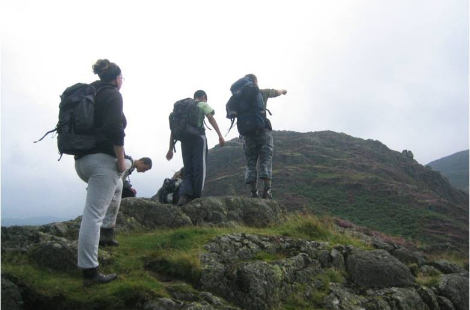When was the last time you were outdoors? Hill-walking or walking the dog, cycling, gardening, playing in a park or building sandcastles on the beach?
What would your life be like if you didn’t get outdoors? What would be the impact on you and your physical and mental health? What about your family? What if the outdoors was never really an experience for you? What price would you pay for it?
Many people across Tyneside, through no fault of their own, have little or no experience of the outdoors. This is especially true for those living in disadvantaged areas of the region (37% of Newcastle’s population lives in the city’s most disadvantaged wards) where lack of money and transport, lack of knowledge and other priorities mean that the outdoors is simply not on their radar.
Even if they do have a local park nearby, they may perceive it as unsafe, especially at night, or they simply don’t have a clue what to do there. Going further afield can be too costly. Lack of knowledge of what’s out there and how to get to it, means for some, the wider countryside is simply out of reach.
The benefits of enjoying the outdoors are well known. The notion of Nature Deficit Disorder, highlighting the disconnection between people and the green space around them, was introduced in 2008 by journalist Richard Louv. And yet, just a year ago, the National Trust (NT) closed its Inner City Project (ICP), a youth and community project working in disadvantaged areas of Newcastle. In 2012, a report on the ICP concluded that it no longer fitted with the NT’s regional business plan and the NT withdrew its support for this project. Abandoning these “hard to reach” communities seems to disregard the NT’s strapline of “Forever, for everyone”.
Octavia Hill, one of the founders of the National Trust, recognised the value of enabling people living in the squalor of industrialised Victorian London to benefit from access to the outdoors. The benefits were clear to her; she maintained that people needed places to sit, play and stroll and places to spend a day. She would walk children from a Ragged School in London to the fields of Marylebone where they could explore and play in the open space.
Her philosophy and approach to working with those in need formed the foundations for the social work and youth and community services we know today. More than 100 years on, the problems of today’s urban life echo those experienced by Octavia Hill, yet opportunities for people in disadvantaged areas of our region to access the outdoors have fallen victim to local spending cuts.
Newcastle City Council’s decision to close its play and youth provision, for example, means voluntary and community groups are being left to fill the gap, but with fewer grants available. Any council funding available is now focused on targeted services, when people have already reached crisis point. It’s unlikely that funds earmarked by the Early Intervention Grant (EIG) for voluntary youth projects will survive the next round of cuts. The impact on people’s quality of life and access to services is significant.
With Tyneside Outdoors, a new youth and community work charity, we’re working to reverse this trend and fill the gap left by the closure of the NTICP, Mobex and other voluntary sector groups in the city. With experienced youth and community workers, we aim to introduce people living in disadvantaged areas of Tyneside to an experience of the outdoors. They deserve to share in the benefits the rest of us enjoy from getting out more.
Kath Lohfink is a volunteer youth and community worker for Tyneside Outdoors, which you can follow on Twitter.
Do you agree with Kath that more needs to be done to help people in disadvantaged areas experience the outdoors? Tell us in the comments section below – by clicking on the little plus sign.
(Views expressed on our website and in our magazines and emails are not necessarily endorsed by Northern Correspondent.)

